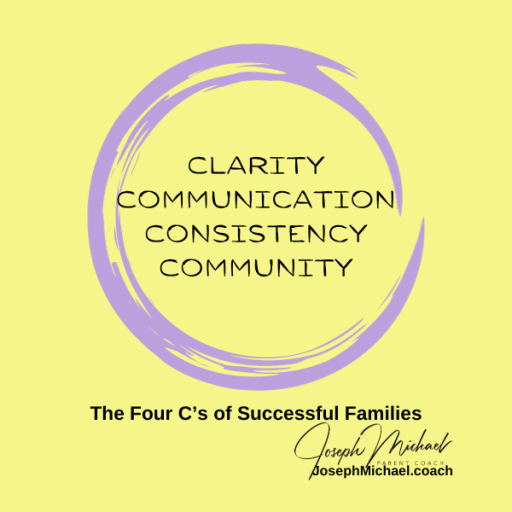
Parenting Empowered With Serenity
In the hustle and bustle of daily family life, it’s easy to get caught up in the demands, responsibilities, and endless to-do lists that come with parenting. But amidst the chaos, there’s a virtue that can bring your family balance, peace, and a sense of well-being: serenity. Serenity isn’t just about staying calm; it’s about creating an environment where each family member can thrive, grow, and connect with one another on a deeper level. However, like any virtue, serenity can be overdeveloped or underdeveloped in family life, leading to imbalance.
Parents
When overdeveloped, serenity might manifest as passivity or detachment. Overly serene parents may become too accepting of circumstances, failing to take necessary action when their children need guidance or discipline. This extreme detachment can make them seem emotionally unavailable, leaving their children feeling unsupported or neglected. On the other hand, when serenity is underdeveloped, parents may become easily agitated, allowing anxiety or fear to dominate their interactions with their children. This lack of calm can create a tense and unstable home environment.
Children
Overdeveloped serenity might be complacency or a lack of motivation for children. A child who is too serene might not strive for success or improvement, being too content with the status quo. They may also withdraw emotionally, not engaging fully with family members or peers. Conversely, children’s underdeveloped sense of serenity can lead to frequent outbursts of frustration or fear. They may struggle to cope with challenges or changes, becoming overwhelmed by their emotions and unable to find peace in difficult situations.
Serenity, the tranquility of spirit, is a powerful virtue that helps us maintain a calm and peaceful demeanor even amid life’s challenges. It is rooted in trust and faith that all will be well, allowing us to accept difficulties with grace and resilience. When we practice serenity, we can approach life with a clear mind, free from the clouding effects of worry or fear.
Balance serenity with these virtues:
1. Courage – Balances serenity by encouraging action and risk-taking when necessary, ensuring calmness does not become passivity.
2. Responsibility – Promotes taking ownership of situations, ensuring that serenity does not lead to neglect of essential duties or decisions.
3. Empathy – Encourages connection with others’ emotions, ensuring that serenity does not become detachment or emotional unavailability.
4. Discipline – Supports the consistent practice of serenity, helping prevent lapses into agitation or fear in challenging situations.
5. Determination – Fuels the drive to improve and grow, countering any tendency toward complacency that might arise from excessive serenity.
By cultivating courage, responsibility, empathy, discipline, and determination, we can ensure that our serenity remains a source of strength, helping us navigate life’s challenges with grace and wisdom while staying fully engaged with our loved ones.
Applying Serenity to Parenting with the Four C’s Framework

When parenting is guided by the virtue of serenity using the Four C’s of Successful Families framework, it becomes a path of grace and peace. Serenity, emphasizing tranquility of spirit and trust in life’s goodness, harmonizes beautifully with the Four C’s framework—Clarity, Communication, Consistency, and Community. Together, they provide a solid foundation for nurturing a calm and resilient family environment.
Clarity:
Serenity in parenting begins with Clarity. By embracing serenity, parents can clearly understand what truly matters in their family life. This tranquility of spirit allows them to reflect deeply on their values and priorities, ensuring they align with their actions. With clarity, parents are better equipped to make decisions that reflect the peaceful and purposeful life they wish to create for their family. This clear sense of direction helps parents focus on fostering a home environment where calmness and trust are at the forefront.
Communication:
Effective Communication is essential for applying serenity in parenting. Serenity helps parents communicate with a sense of calm and presence, even amid chaos. This calm demeanor encourages open and honest dialogue, allowing family members to express their thoughts and feelings without fear of judgment or conflict. When parents communicate serenely, they model patience and understanding, creating a safe space for their children to share their emotions and challenges. This leads to deeper connections and a more harmonious family dynamic.
Consistency:
Consistency is key in reinforcing the practice of serenity in family life. When parents consistently apply serenity to their parenting, they create a stable and predictable environment for their children. This means responding to situations with the same calm and measured approach, whether dealing with daily routines or unexpected challenges. Consistent serenity helps children feel secure, knowing that their parents will remain steady and supportive no matter what arises. This stability fosters trust and resilience in children, empowering them to approach life calmly.
Community:
Community plays a vital role in supporting a family’s commitment to serenity. By surrounding themselves with a community that shares and supports their values, parents can draw strength and encouragement in their practice of serenity. This might involve connecting with other families who prioritize peace and mindfulness or seeking resources and support networks that reinforce their commitment to calm parenting. A strong community reassures parents that they are not alone in their journey and that they have a network of like-minded individuals to turn to in times of need.
Incorporating serenity into parenting within the Four C’s framework helps create a family life rooted in peace, clarity, and connection. Parents can cultivate a serene and supportive environment where their children can thrive by focusing on clarity, communication, consistency, and community. As you navigate the ups and downs of parenting, remember that serenity is your ally—a source of strength and calm that will guide you through even the stormiest seas. Embrace the Four C’s, and let serenity lead the way to a more peaceful and fulfilling family life.
Joe is a husband, father, grandfather, author, speaker, educator, course creator, and parent/family coach.
He helps parents develop unity, find clarity, communicate, and develop consistency in their parenting with the Four C’s of Successful Families. You can find his work on social media.
In addition, the Four C’s newsletter is enjoyed by many as it encourages parents to self-care, build their relationships with their partners, and raise their children.
And he loves to golf!

